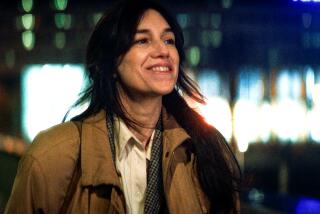Luminous ‘Ponette’ Gives a Child’s View of Life After Death
- Share via
To watch Jacques Doillon’s “Ponette”--one of the most sensitive, luminous films about the very young ever made--is to be reminded that the French cinema has traditionally paid more attention to children than that of any other country. Even in the many French films not primarily concerned with youngsters, they are a vivid presence and are taken seriously. In dealing with the impact of death on a 4-year-old, “Ponette” will inevitably recall Rene Clement’s similarly themed “Forbidden Games” (1952), a classic among French films.
A young woman has been killed in a car accident, leaving her widower (Xavier Beauvois) to cope with their daughter, Ponette (Victoire Thivisol, age 4), who refuses to accept that she will never see her mother again. Her father leaves Ponette in the care of the child’s aunt (Claire Nebout), who lives in the country with her own two children, Matiaz (Matiaz Bureau), about Ponette’s age, and Delphine (Delphine Schiltz), who looks to be 6 or 7.
Ponette has landed in a loving, idyllic atmosphere, but like so many people of all ages, she discovers that she is essentially alone in coping with such a loss. Her father is a flat-out atheist, and her well-meaning aunt tells Ponette of Christ’s Resurrection to comfort her, only to inadvertently give her the hope that her mother will experience a Second Coming herself. (Alas, it clearly never occurs to these adults to get their stories straight for the child’s benefit.)
As Ponette interacts with her sweet-natured cousins (the angelic Matiaz especially) and with other children at school, we get a good idea of how hard it is for small children to make sense of so much contradictory and incomplete information of the various ways in which people deal with life and loss. The effect of all this input is simply to reinforce Ponette’s firm belief that if she prays hard enough to God her mother surely will appear to her.
In tackling such a story, Doillon has pulled off something of a miracle as he takes us into the world of the very young, letting us experience with them their sense of constant fresh discovery and gradual comprehension. How ever did he get these toddlers to respond to the camera without a trace of self-consciousness? How did he get such performances from them? And performances, no matter if they’re essentially playing themselves, is what they are. How did he create such spontaneity, such a quality of authenticity? (The information that Doillon and his assistants set up workshops with the children does not begin to explain the magnitude and quality of his own inspiration.) All the children in the film emerge as distinct individuals and personalities, not just Ponette.
You well understand how the judges at the Venice Film Festival last year named Victoire Thivisol best actress. As the grief-stricken yet doughty Ponette, she takes us steadfastly through all of Ponette’s moods--her pain, her fleeting joys, her resolution. So acute and constant an observer is Doillon, a 20-year film veteran whose work almost never reaches America, that he carries off moments that a lesser filmmaker could never hope to attempt.
Intimate, tender yet resolutely clear-eyed, “Ponette” is in all its aspects a remarkable achievement.
* Unrated. Times guidelines: In its dealing with the impact of death on the very young, the film is too intense for the small children it features.
(BEGIN TEXT OF INFOBOX / INFOGRAPHIC)
‘Ponette’
Victoire Thivisol: Ponette
Matiaz Bureau: Matiaz
Delphine Schiltz: Delphine
Xavier Beauvois: The father
Claire Nebout: The aunt
An Arrow release. Writer-director Jacques Doillon. Producer Alain Sarde. Cinematographer Caroline Champetier. Editor Jacqueline Fano. Costumes Astrid Traissac. Music Philippe Sarde. Art director Henri Berthon. In French, with English subtitles. Running time: 1 hour, 32 minutes.
* Exclusively at the Music Hall, 9036 Wilshire Blvd., Beverly Hills, (310) 274-6869.
More to Read
Only good movies
Get the Indie Focus newsletter, Mark Olsen's weekly guide to the world of cinema.
You may occasionally receive promotional content from the Los Angeles Times.










